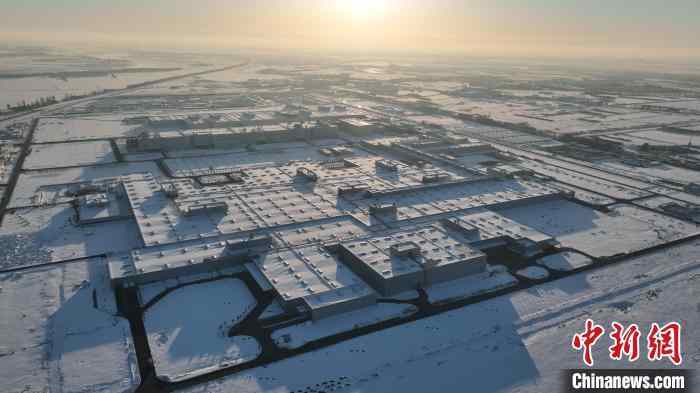Foreign companies still full of confidence when looking at prospects of Chinese market
Cosmetics giant L'Oréal lately announced the establishment of its first investment company in China, which mirrors the vibrant flow of foreign investment into China.
Amid the lingering cases of COVID-19, many multinationals have gathered pace to occupy larger shares of international markets, among which the Chinese market remains one of their favorites.

Container trucks travel back and forth as they shuttle shipments at the Yangshan Deep Water Port, Shanghai. (China News Service/Yin Liqin)
Shanghai Meicifang Investment Co., Ltd., L'Oréal’s first investment company in China, was established at the Oriental Beauty Valley, Fengxian district, Shanghai. This was also the first investment project in China signed by a Fortune Global 500 company during the resumption of work and production in Shanghai after a new wave of Omicron cases.
Although production faces some uncertainties in the current circumstances, L'Oréal’s business maintained steady growth during the first quarter of the year, and L'Oréal China saw a double-digit increase in its business performance, higher than the average level for the overall cosmetics market, said Fabrice Megarbane, president of L'Oréal North Asia Zone and CEO of L'Oréal China, adding that the group is still optimistic about the Chinese market.

Visitors try out cosmetic products at the consumer goods exhibition area during the China International Import Expo (CIIE). (China News Service/Yin Liqin)
Besides cosmetics companies like L'Oréal, foreign enterprises in other industries have also enhanced their investments into the Chinese market.
Multinational pharmaceutical company Merck plans to invest an additional 100 million euros to expand its first single-use manufacturing center in the Asia-Pacific region located in Wuxi National High-tech Industrial Development Zone, east China’s Jiangsu province. The project is scheduled to be operational before 2024 and will create nearly 1,000 jobs. And the expanded manufacturing base is expected to become one of the three global manufacturing centers of Merck’s life science business sector.
Data from the Ministry of Commerce (MOFCOM) showed that 185 new contracts entailing foreign direct investments worth over $100 million each were signed in China during the first four months of the year, which meant that an average of 1.5 large-scale foreign-funded projects were introduced into China every day. The fundamentals of the foreign trade industry for long-term growth remain unchanged.

Aerial photo shows the exterior of an assembly shop at a factory operated by BMW Brilliance Automotive Ltd., a Chinese-German joint venture, in Tiexi district, Shenyang city, northeast China’s Liaoning province. (Photo/China Construction Second Engineering Bureau Ltd. Northern Branch)
Compared with international trade, which depends more on the current state of market supply and demand, international investment places more emphasis on the long-term fundamentals and development potential of an economy, said Bai Ming, deputy director of international market research at the Chinese Academy of International Trade and Economic Cooperation, who believes that in the face of challenges, China’s huge market potential, strong and effective supportive measures, and continuously improving business environment have boosted foreign investors’ confidence in the Chinese market.
According to Jin Xiandong, a spokesperson for the National Development and Reform Commission, China revised the negative lists for foreign investment access in the country and in its pilot free trade zones (FTZs) for five consecutive years from 2017 to 2021, which have cut special management measures for foreign investment access from 93 and 122 to 31 and 27, respectively. Besides, it has launched a number of major measures for further opening-up in the areas of finance and automobiles, providing a broader space for foreign investment.
In recent years, China has moved increasingly faster to formulate and improve relevant laws and regulations, with the Foreign Investment Law and related regulations now being fully implemented, which has fundamentally guaranteed the interests of foreign investors and created a more law-based business environment for foreign investors and foreign-invested enterprises.
In response to the pandemic, China’s timely and effective policies, including the largest tax rebate and reduction moves in its history totaling 2.5 trillion yuan ($371 billion), as well as rent cuts and exemptions and loan extensions at the central and local levels, have also encouraged foreign companies to enhance their investments in the country.
Photos
Related Stories
- China's investment in road, waterway infrastructure up in first four months
- China to continue stabilizing foreign investment amid challenges
- China approves investment projects worth over 78 bln USD in Jan.-April
- China's fixed-asset investment up 6.8 pct in Jan.-April
- Coastal province Fujian attracts growing foreign investments
- With more opening-up measures in pipeline, China set to remain appealing to overseas investors
- China to prioritize employment in fiscal and monetary policies, mobilize existing assets to boost effective investment
- China to encourage foreign investment in more industries
- China’s fixed-asset investment gets off to a good start
- China's fixed-asset investment up 9.3 pct in Q1
Copyright © 2022 People's Daily Online. All Rights Reserved.










